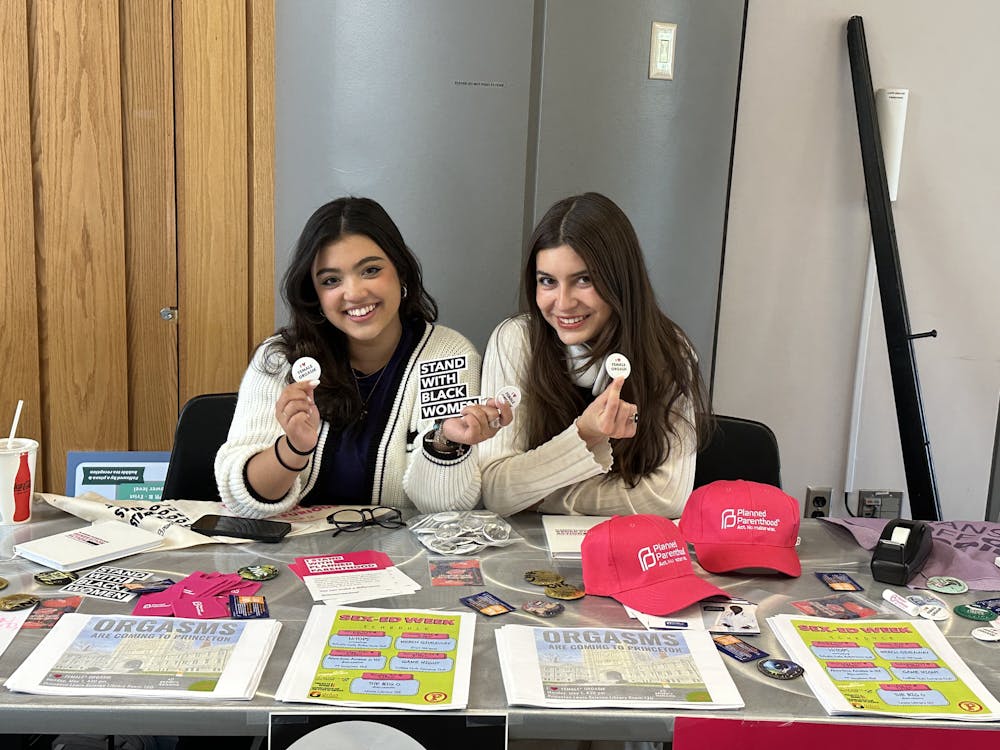When safety precautions for COVID-19 forced students off of campus for over a year, many students disengaged with their clubs. When students finally returned to campus, the character and composition of many clubs had changed, often including a loss of membership and engagement.
Princeton Students for Reproductive Justice (PSRJ) — a group that began just prior to the pandemic — however, has seen its membership and engagement increase, allowing them to put on more events and provide more services to the campus community.
“We have been going through a total rebranding, because PSRJ started pretty recently, it was just started by a small group of women who cared. During COVID, it just kind of fell apart, unfortunately,” said PSRJ co-president Francesca Pauca ’24. “Once COVID started to end, there were a handful of people who decided that it was time for PSRJ to have a large role on Princeton’s campus again.”
Sofia Baran ’24, the group’s other co-president, told the ‘Prince’ that the group has “never had as many people before.”
In previous years, PSRJ members volunteered at the Women’s Center in Cherry Hill, N.J. as abortion clinic escorts, but post-pandemic, the group has shifted its focus and “redefine[d] what [its] volunteer capacity looks like.”
Pauca said that PSRJ’s biggest initiative last semester was their first “Sex Ed Week,” described as “an unconventional, inclusive, and interactive sex education.”
“We just decided that we wanted to be upfront,” Pauca said. “We had pens and said ‘I love the female orgasm’ and stuff like that. It was definitely awkward to do that at first, but we just decided that it was worth it and that our mission was to destigmatize sex, because it’s a very important thing on college campuses to talk about, especially for marginalized groups.”
Increasing spaces for open discussion of sex on campus has not been without controversy. In 2021, conservative writer Rod Dreher targeted one event in an article titled “Hiney-Lickers Of Princeton,” highlighting pamphlets supposedly handed out by RCAs on forms of sex as exemplifying decadence at elite colleges.
PSRJ’s partners have had their own controversies among conservative circles. PSRJ has collaborated with HiTOPS, a New Jersey nonprofit that develops sex education for middle and high schoolers, to create a curriculum that bridges the “transitional point between high school and college” sex education, Baran said. Conservative activist group Project Veritas recently targeted HiTOPS for covering gender and sexual orientation in Princeton Middle Schools.
Another PSRJ initiative was spurred by the Supreme Court’s release of the Dobbs v. Jackson Women’s Health Organization decision in June 2022. As a member of the Planned Parenthood Generation Action, PSRJ was in communication with the CEO of Planned Parenthood preceding the decision, Baran said.
“That essentially involved a mobilization of all of our forces and all of our communication channels. We were collecting information from wherever there was a protest going on, whatever advocacy opportunities there were at that exact moment. We sent out a bunch of representatives to New York, D.C., Pennsylvania, New Jersey, even on the Princeton campus itself. Then we ended up organizing a rally in conjunction with a lot of community members.”
Amid these new initiatives, PSRJ has continued to focus on their bedrock goals pertaining to sexual health and well-being: providing access to condoms and Plan B.
Condoms are currently available for free in Residential Colleges outside the doors of Residential College Advisors, so PSRJ has focused on providing them in upperclassmen dorms and eating clubs. The club is currently working on 3-D printing condom vending machines, both co-presidents told the ‘Prince.’
PSRJ also has an Emergency Contraceptives initiative in which students are able to anonymously request Plan B to be delivered to any on-campus location between 9 a.m. to 6 p.m and PSRJ on-call volunteers will deliver the pill within the day.
Chinyere Aguwa ’25, a Rockefeller College Peer Health Adviser and Sexual and Reproductive Health Group Leader, said she had previously heard of a student group that provided emergency contraception, but not in an anonymous format.
“Especially for those that don't feel comfortable talking about sex with other people or they may feel shame about that risk of having unprotected sex in the first place, I think having the hotline honestly can be very effective,” she said.
Mattie Isaac ’27 told the ‘Prince’ that “Sometimes students just don’t know where to go, or they don’t want to ask people because they may feel uncomfortable or embarrassed, so I think [the hotline] is a great way to make sure people are getting the care or supplies they need.”
Baran estimated that hotline volunteers make between 10–15 deliveries per week, and funds its services through external sources like grants and fellowships, but receives little funding from the University.
“Even though we’re a recognized organization on campus, and we used to get funding through the Pace Center’s Student Volunteer Council Fund, we no longer get that because of the lack of external work that we’re doing,” she said.
Aguwa added, “Being able to have these student groups come together and have these initiatives [is] a way of creating a sort of safe space and allows students to know that there are so many resources available.”
Julian Hartman-Sigall is an assistant News editor for the ‘Prince.’
Elisabeth Stewart is a News contributor for the ‘Prince.’
Please send corrections to corrections[at]dailyprincetonian.com.





